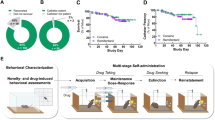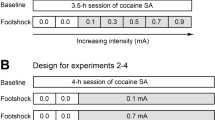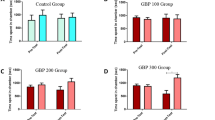Abstract
“ADDICTION” to morphine and morphine-type drugs can be shown in laboratory animals in several ways. Among the most convincing1 are experiments in which rats and monkeys are induced to administer the drug to themselves either by drinking solutions of it2,3 or by pressing levers which release intravenous injections through an implanted catheter4,5. Standard experimental procedures involve a period of premedication: daily injections of increasing doses of morphine are given for 2–3 weeks in order to make the animals “passively” dependent on the drug. Injections are then stopped and the animals have withdrawal symptoms6,7 which are only relieved by more morphine; so they learn to seek and self-administer the drug. Monkeys will, however, learn to press levers for intravenous injections even without premedication, though such learning is much slower. Some monkeys will also voluntarily drink morphine solutions, which are bitter, but others persistently reject them unless pre-medicated (personal communication from Seevers). In rats, premedication has usually been considered essential for learning either kind of self-administration, but even premedicated rats will initially reject morphine solutions if given a choice between them and water, probably because of the bitter taste.
This is a preview of subscription content, access via your institution
Access options
Subscribe to this journal
Receive 51 print issues and online access
$199.00 per year
only $3.90 per issue
Buy this article
- Purchase on Springer Link
- Instant access to full article PDF
Prices may be subject to local taxes which are calculated during checkout
Similar content being viewed by others
References
Steinberg, H., Kumar, R., Kemp, I., and Bartley, H., Proc. Symp. on the Pharmacological and Epidemiological Aspects of Adolescent Drug Dependence (in the press).
Nichols, J. R., Headlee, C. P., and Coppock, H. W., J. Amer. Pharm. Assoc., 45, 788 (1956).
Nichols, J. R., and Davis, W. M., J. Amer. Pharm. Assoc., 48, 259 (1959).
Weeks, J. R., Science, 138, 143 (1962).
Yanagita, T., Deneau, G. A., and Seevers, M. H., Excerpta Med. Int. Cong. Series, 87 (1965).
Martin, W. R., Wikler, A., Eades, C. G., and Pescor, F. T., Psychopharmacologia, 4, 247 (1963).
Buckett, W. R., Psychopharmacologia, 6, 410 (1964).
Thompson, T., and Ostlund, W., J. Comp. Physiol. Psychol., 60, 388 (1965).
Author information
Authors and Affiliations
Additional information
An erratum to this article is available at https://doi.org/10.1038/218798e0
Rights and permissions
About this article
Cite this article
KUMAR, R., STEINBERG, H. & STOLERMAN, I. Inducing a Preference for Morphine in Rats without Premedication. Nature 218, 564–565 (1968). https://doi.org/10.1038/218564a0
Received:
Published:
Issue Date:
DOI: https://doi.org/10.1038/218564a0
This article is cited by
-
Obituary: Professor Hannah Steinberg
Psychopharmacology (2020)
-
Concurrent etonitazene and water intake in rats: Role of taste, olfaction, and auditory stimuli
Psychopharmacology (1979)
-
Resistance of morphine-seeking behaviour in rats to pharmacological and behavioural ‘treatments’
Nature (1978)
-
Aversiveness of oral methadone in rats
Psychopharmacology (1978)
-
Morphine ingestion: Genetic control in mice
Psychopharmacology (1977)
Comments
By submitting a comment you agree to abide by our Terms and Community Guidelines. If you find something abusive or that does not comply with our terms or guidelines please flag it as inappropriate.



